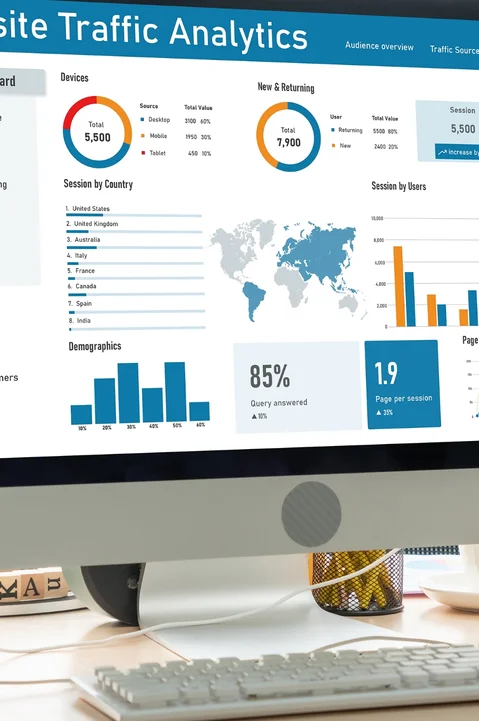Pipe Process
Centric pipe process involves a systematic approach to designing, coding, testing, and deploying software or digital solutions, ensuring efficient collaboration, iterative improvements, and adherence to project goals and requirements.

We sculpt SEO narratives, charting journeys that ensure your brand's voice doesn't just echo but sings. With the use of in-house tools and agency partnerships, we navigate the ever-changing SEO landscape to highlight your presence through white label local SEO services, eCommerce SEO, and Enterprise SEO solutions.





From Google Business optimization to hyper-local keyword strategies, we ensure your brand stands out in local searches, driving more foot traffic, calls, and conversions from customers in your area.
We optimize your Google Business Profile to ensure top local rankings, accurate business information, and enhanced engagement; helping customers find and choose you faster.
We place your business in high-authority local directories to improve visibility, build trust, and enhance local search rankings; ensuring customers can find and connect with you.
We identify and optimize for local search terms that drive high-intent traffic, ensuring your business ranks for the exact queries customers use when looking for services near them.
We ensure your website is technically sound, mobile-friendly, and optimized for local search, so search engines rank it higher and customers have a seamless experience.

E-commerce SEO is about attracting high-intent buyers and turning them into repeat customers. We optimize your store for search visibility, seamless navigation, and higher conversion rates. Book a free ecommerce seo consultation.
Every product page should be a conversion engine. We optimize your titles, descriptions, images, and metadata to ensure they rank high and compel visitors to buy.
We implement structured data to make your store more searchable, clickable, and rich in Google’s results.
We create a powerful backlink profile that strengthens your store’s domain authority and propels your rankings forward.
Your e-commerce site should be easy to navigate, fast to load, and built for both users and search engines.
Using tools like HotJar; we generate eye-ball heatmaps and session recordings, we analyze user behavior and optimize your store for maximum conversions.

AEO services in the USA helping brands rank as trusted answers across AI search. We optimize content, structure, and visibility for smarter discovery.
Before optimizing, we assess your brand’s current visibility across AI-driven platforms.
Our AEO audit identifies gaps in structured data, entity recognition, and semantic context that limit discoverability. We benchmark your brand’s performance in traditional SERPs and emerging AI search formats. This audit fuels a smarter roadmap, tailored to position your business as a trusted, featured source.
Search engines and AI prioritize content that is well-organized, accessible, and semantically rich. Centric restructures your content into machine-readable formats with schema markup, entity mapping, and topical clustering. We create frameworks that make your answers easier to retrieve, rank, and feature across rich results and AI tools. This ensures your brand surfaces at critical decision points with authority and accuracy.
Your digital presence defines how AI platforms summarize your brand in SERPs, voice search, and chatbot responses. We optimize metadata, on-page signals, and off-site references to reinforce your brand’s identity and core messaging. By shaping the context around your content, we help ensure you’re not misrepresented or buried in generic answers. Centric gives you control over how and where your brand is seen and trusted.
AEO is powered by entities, not just keywords and Google uses Knowledge Graphs to surface authoritative brands. We connect your business to relevant entities using structured data, citations, and high-authority backlinks. Our strategies boost your domain’s credibility and topical authority, signaling to AI that you're a reliable source. This is how your content gets featured, not just indexed across intelligent search results.
From your website and blog to social media and third-party directories, consistency is key for AEO success. We unify brand messaging, schema implementation, and structured data across all digital touchpoints. This creates a coherent digital footprint that reinforces your relevance across every AI and search system. Centric ensures your brand stays aligned, recognizable, and favored wherever users search.
AI search is constantly changing and so are ranking signals. Centric provides ongoing optimization, entity monitoring, and algorithm tracking to keep your brand at the forefront. We adapt your AEO strategy with real-time data, new content opportunities, and evolving best practices. With us, your visibility doesn’t just rise, it stays ahead of competitors and future-proofed against search shifts.

We engineer large-scale strategies, optimize complex site structures, and deploy authoritative content to ensure your brand is found, trusted, and chosen.
We optimize every technical element of your site; from crawlability and indexation to site speed and schema; ensuring search engines and users find, navigate, and trust your content.
We secure high-quality, authoritative backlinks that boost your domain credibility, drive organic traffic, and position your brand as an industry leader in the digital ecosystem.
We turn your brand into a recognized thought leader by crafting compelling narratives, securing media coverage, and earning high-value placements that boost authority, trust, and organic rankings.
We go beyond keywords; our advanced clustering techniques identify intent, optimize content themes, and align every page with the right search queries for maximum visibility and engagement.

Harness the power of automation to create, optimize, and interlink thousands of pages effortlessly. Our programmatic SEO strategies ensure search engines understand, index, and rank your content at scale.
We optimize site speed, indexing, and crawlability, ensuring search engines can navigate, understand, and rank your content effectively.
We refine your architecture to enhance user experience, optimize crawl efficiency, and create logical pathways for both users and search engines.
Our automated page creation strategies ensure content freshness, relevance, and discoverability; without sacrificing quality.
We create a structured, interconnected web of content that enhances user engagement and strengthens internal page authority.
Our intelligent tagging structures help search engines understand your content better, improving rankings and driving richer search results.

With precision tools and data-driven strategies, we take SEO beyond guesswork. As a Semrush Agency Partner, and with proprietary on-page audit and rank tracking tools, we refine visibility, rankings, and digital dominance.
As a Semrush Agency Partner, we tap into enterprise-grade SEO insights, competitor benchmarking, and real-time performance tracking.
Our proprietary SEO On-Page Audit Tool scans every corner of your website, identifying critical issues that impact rankings; from missing metadata to crawl errors; so nothing holds you back.
With our Automated Rank Checker, you’ll always know where you stand. Track keyword positions in real-time, monitor fluctuations, and refine your strategy to stay on top of search rankings.
Centric pipe process involves a systematic approach to designing, coding, testing, and deploying software or digital solutions, ensuring efficient collaboration, iterative improvements, and adherence to project goals and requirements.

SEO (Search Engine Optimization) refers to the practice of optimizing websites to improve their ranking on search engine result pages (SERPs). By enhancing aspects like on-page SEO, content creation with optimization, and backlink strategies, SEO aims to increase organic visibility and traffic. The goal is to ensure that a website ranks higher for relevant search terms, making it easier for potential customers to find your services or products.
SEO companies specialize in improving a website’s visibility on search engines like Google. These companies offer a range of search optimization services, from on-page SEO like content optimization and meta tag improvements, to off-page SEO including backlink strategies. They also provide SEO marketing services to enhance a business's digital presence, implement global SEO services, and tailor strategies for specific needs, such as ecommerce SEO services for online stores or international SEO company strategies for global reach.
An SEO marketing agency focuses on enhancing a business’s visibility and performance through search engine optimization strategies. These agencies offer search engine marketing services, including keyword research, content strategy, and website optimization, to attract and retain customers. Agencies can specialize in areas such as ecommerce SEO company services, international SEO company strategies, and even WordPress SEO.
The 80/20 rule for SEO suggests that 80% of the results come from 20% of the efforts. In SEO, this could mean focusing on the most effective optimization strategies—like on-page SEO service and targeting the best SEO tools for small businesses—to yield the highest returns. It encourages businesses to focus their resources on the strategies that drive the most organic traffic.
SEO packages are comprehensive service bundles offered by SEO marketing agencies that include a set of SEO services designed to meet a client’s needs. These can range from basic on-page SEO services like keyword optimization and content improvement to more advanced services, including SEO services for ecommerce or search engine marketing agencies offering paid campaigns to complement organic growth.
The cost of hiring an SEO company can vary based on factors such as the scope of work, competition in your industry, and the company’s experience. Generally, hiring a professional SEO firm can cost anywhere from a few hundred to several thousand dollars per month, depending on whether you choose a top-rated SEO company or a more specialized SEO agency, like those focusing on ecommerce SEO or global SEO services.
For e-commerce food companies, the investment in SEO can range based on the size of the business, competition, and market goals. As food ecommerce is highly competitive, focusing on a well-rounded ecommerce SEO specialist approach—optimizing product pages, improving user experience, and implementing technical SEO —is key to maintaining a competitive edge.
The cost of SEO services for small businesses depends on several factors, such as the nature of the business and the complexity of the SEO strategy. Small businesses might opt for affordable SEO marketing agencies or local SEO agencies offering customized plans that fit within a modest budget. On average, small businesses can expect to pay anywhere from $500 to $5,000 per month, depending on their needs.
Yes, SEO for small businesses is crucial for long-term success. It helps to increase organic traffic, improve brand visibility, and build trust with potential customers. For small businesses, local SEO services can be especially beneficial, as they focus on improving rankings for location-specific search queries, making it easier for customers to find your business nearby.
Choosing a good SEO company involves evaluating their experience, portfolio, and ability to provide tailored strategies. You should look for agencies that offer custom SEO strategies, including both on-page SEO services and off-page SEO efforts. Agencies should provide transparent reporting, measurable results, and a clear understanding of your industry.
A good SEO company is defined by its ability to implement effective search optimization services that align with a client’s business objectives. This includes expertise in technical SEO, quality backlinking, and a deep understanding of algorithms. The best SEO agencies also stay updated with the latest trends in SEO marketing and use SEO tools for small businesses to continually refine strategies.
Centric’s approach to organic SEO growth combines the power of targeted SEO marketing with proven strategies for content development, technical optimization, and backlink strategies. With a focus on delivering measurable results, Centric stands out as a top-rated SEO company for businesses looking to grow their organic presence.
Centric is the best local SEO agency in Houston due to its comprehensive approach to optimizing websites for location-based search queries. By leveraging local SEO services, we help businesses rank higher in Google My Business results, enhance their visibility on local search engine results, and drive more foot traffic to physical locations.
Yes, Centric provides custom SEO strategies tailored to each client’s unique needs. Whether it’s on-page SEO, content optimization, or technical SEO, our team ensures that every aspect of the SEO plan is optimized to deliver long-term success.
Centric offers a wide range of technical SEO services, including website speed optimization, mobile-first indexing, site architecture analysis, and schema markup implementation. Our services also include magento SEO for ecommerce sites and strategies for WordPress SEO, ensuring your site is fully optimized for both users and search engines.
SEO agencies combine search engine marketing with digital marketing strategies, including social media marketing, email campaigns, and content marketing. By integrating these elements, they ensure that businesses have a comprehensive, multi-channel approach to drive traffic, enhance visibility, and boost conversions.
To find a reliable ecommerce SEO company, look for agencies with proven expertise in SEO services for ecommerce. They should offer tailored solutions that include e commerece site audits, keyword research, and content optimization. Be sure to check client reviews, case studies, and the company’s approach to search engine optimization services.
A main service page for SEO should include clear call-to-action elements, a description of the SEO services provided (such as on-page SEO and technical SEO services), and case studies or success stories. The page should also feature keyword-optimized content for terms like best SEO companies and SEO marketing agencies to help improve its search engine ranking.
For small businesses, SEO tools for small businesses like Moz, SEMrush, and Ahrefs are excellent options for managing SEO efforts. These tools offer features like keyword tracking, backlink analysis, and site audits that allow small businesses to optimize their websites efficiently.
For optimal Google SEO, website builders like WordPress and Wix (with SEO plugins like Yoast) offer great flexibility. These platforms provide built-in SEO features such as SEO-friendly templates, meta tag customization, and mobile optimization, making them ideal for businesses seeking a strong SEO foundation.
Yes, Google SEO remains a critical aspect of any digital strategy. With Google continuously evolving its algorithm, businesses must stay up to date with the latest SEO practices to maintain or improve their search rankings. Investing in SEO services for small businesses is essential for long-term online visibility.
In web development, SEO refers to the integration of search engine optimization services into the development process to ensure that the website is search-engine friendly. This includes optimizing the site’s speed, mobile responsiveness, code structure, and content management systems (CMS) to improve organic search rankings.

Spanning 8 cities worldwide and with partners in 100 more, we're your local yet global agency.
Fancy a coffee, virtual or physical? It's on us – let's connect!






Spanning 8 cities worldwide and with partners in 100 more, we're your local yet global agency.
Fancy a coffee, virtual or physical? It's on us – let's connect!